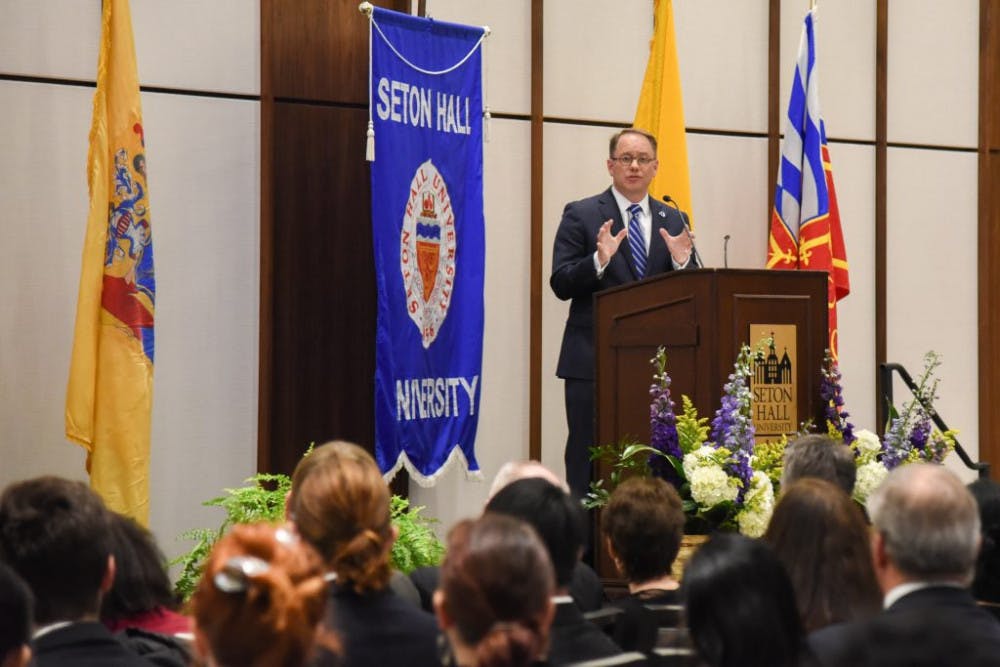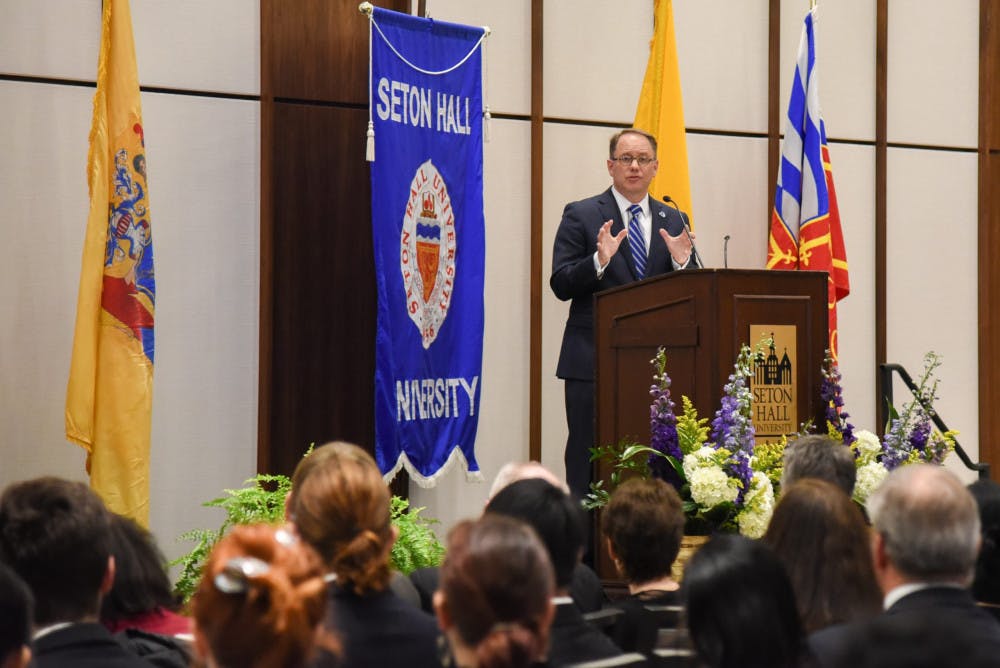Two weeks ago Seton Hall officially announced its fall reopening plan, making it one of the first colleges in the country and the very first in the state of New Jersey to reveal how it plans to function in the midst of a global pandemic.
According to the University, Seton Hall will embrace what has come to be known as the "Hybrid Flexible" instruction model, which will allow students to choose to whether or not they will engage in distance learning or return for in-person instruction in the fall on a case-by-case basis. Additionally, the school will forgo its normally scheduled fall break and dismiss students home for the remainder of the semester ahead of Thanksgiving Break in order to avoid a possible second-wave of infections that some public health officials are warning could occur in the fall.
With some details of what in-person instruction could look like come August still foggy, The Setonian reached out to Seton Hall President Dr. Joseph Nyre with questions about what the fall will look like for students, why Seton Hall was ahead of the curve on announce its reopening, tuition for the coming semester and how the school plans to protect students from infection.
This interview has been lightly edited for clarity.
NICHOLAS KERR, Editor-in-Chief of The Setonian: In the national discussion around colleges reopening, some have said that institutions who have announced plans to reopen in the fall are simply posturing in an attempt to keep students, particularly incoming freshmen, enrolled. With that said, Seton Hall was the first school in New Jersey to lay out a definitive reopening plan, while Princeton – the first college in the state to pivot to distance learning back in March – has said that they plan to wait until July to make a decision about the fall. How did Seton Hall come to the decision to reopen so early and what motivated the University to move so quickly?
JOSEPH NYRE, President of Seton Hall University: Actually, the University’s planning efforts began in earnest several months ago. Seton Hall was an early responder to the outbreak — establishing the University-wide Health Intervention and Communication Team and cancelling study abroad in early March. We know thoughtful, inclusive planning is imperative, and our fall 2020 plans reflect that.
We think it is important to regularly communicate the status of our planning. This is what we committed to do, what we have been doing, and what we will continue to do. Our students, their families, our priests, faculty and employees all deserve timely, accurate information.
All universities are different, and their planning cycles and plans will likely be different. I agree with Dr. Fauci, that solutions “will not be a one size fits all approach.”

KERR: In your email to the University community, you noted that residence halls will be operating at reduced capacity for the fall. How will the University enforce social distancing, particularly when some dorm suites can have as many as six-plus people at a time?
NYRE: Our plans, informed by scientific experts and government leaders, will provide that guidance. Ultimately, the degree of the permitted density will likely be directed by the State of New Jersey. Nonetheless, we have plans for varying levels of occupancy.
Appropriate distancing not only requires increased physical space ratios, but also behavioral changes. Everyone in the campus community will share responsibility to engage in healthy behaviors, including distancing. We will orient our entire community to best procedures and practices. It is a tremendous effort that includes important educational, collaboration and communication components.
But at the end of the day, we will need to work together, and we will. Universities, businesses and other communities that commit to shared, responsible and safe behaviors will succeed. Those that do not will encounter difficulties.
KERR: Governor Phil Murphy recently rolled out his administration’s five-stage reopening plan, with stage two describing the potential gradual reopening of K-12 and higher education institutions at reduced capacities and stage three detailing the definite reopening of schools at reduced capacities. According to the Governor, the state is still in stage one and he has been reluctant to give a timeline for when New Jersey will even reach stage two, let alone stage three. Despite this, Seton Hall’s announcement seemed confident that universities will be allowed to reopen in August. What is this assessment based on, and did you personally have any discussions with state officials about a reopening in late August and, if so, what did they say?
NYRE: We are in daily contact with science and government officials at the local, state and national levels. Informed by those consultations, and by the expertise of our own Seton Hall healthcare professionals, we have put forward the best plan for our University community to reduce risk and continue to provide a high-quality learning and living experience.
Risks will be reduced by moving up the start date slightly, providing students choice for on- or off-campus learning, ending in-person instruction at Thanksgiving and holding finals remotely. However, we are fully cognizant that opening the Eastern Seaboard will require safe behaviors throughout the summer, continued reduction in spread, and increased testing capacity. We have reinforced all these variables and more within our community and with government officials.
KERR: Some universities have reportedly explored renting off-campus housing for students to accommodate everyone who plans to dorm – is this an option Seton Hall has explored? Will any student who has submitted a housing deposit be turned away from University housing if there are not enough beds as a result of the reduced capacity?
NYRE: We have and continue to explore multiple options. The State of New Jersey will likely have the final word on campus housing. We are modeling various residence hall scenarios. Our preference is to accommodate as many students who wish to live on campus as possible; we believe we can clean, support and monitor on-campus housing to a much greater degree than students may find in off-campus housing.
KERR: What specific social distancing measures is the University planning to implement in the fall to accommodate in-person instruction in classrooms? Will face masks or shields be required for students and instructors? One of the ideas that has been floated nationally is the idea of Plexiglass shielding around professors’ podiums – is that an idea Seton Hall has explored at all?
NYRE: Numerous safety measures will be implemented, and we will continue to update the University community through additional announcements distributed via email, social media, and our website.
We also created a place on the site for members of the community to ask questions.
We plan, among other actions, to reduce density in buildings and classrooms, utilize standard PPE (with and without plexiglass), deploy distancing conventions in highly trafficked areas and service locations, and conduct regular health monitoring.
KERR: There has been a lot of discussion in higher education spheres around what enrollment numbers will look like for the Class of 2024. Where are Seton Hall’s enrollment numbers currently, and do you foresee them possibly rising with the announcement that the University will be open for in-person instruction in the fall?
NYRE: It is far too soon to definitively tell. We are greatly encouraged that the number of upper-level students planning to return this fall is even greater than where it was last year at this time. Sharing planning details with our community is responsible, and essential for students and their families to make well-informed decisions with as much lead time as possible.
KERR: You stated in your testimony before the New Jersey State Senate Committee on Higher Education that the University is budgeting with $33 million less revenue than initially anticipated. Additionally, earlier this week Moody’s downgraded Seton Hall’s bond credit rating – though noted that the new rating is stable. What would you say to those who are concerned about the financial future of Seton Hall?
NYRE: COVID-19 is a spotlight illuminating cracks, fissures and fractures in every sector of the economy — from the supply chain to health care and Wall Street to Main Street. Higher education is no different. The coronavirus is accelerating trends that have existed for some time.
Fortunately, Seton Hall is well-positioned to emerge on the other side of these uncertain days shining a bright light on possibilities for the future. The University fully expected a downgrade as it pursues a debt issuance of $109 million, and understood that the downgrade would not substantively affect borrowing rates and Seton Hall’s overall financial strength.
Seton Hall has a strong financial foundation and continues to make thoughtful, prudent budget decisions to preserve it. This was confirmed by Moody’s, who noted as much in its report. The one-notch rating downgrade was expected and came as we explore an approach to capital markets, taking advantage of low borrowing rates to finance strategic improvements to student learning and living facilities. The rating also noted Seton Hall’s outlook as stable, further confirming the University’s fiscal strength, which enables our ability to tap into these sources of funding.
KERR: Nationally, tuition increases have been a hot topic of conversation given the state of the United States economy and record high unemployment numbers. Given these circumstances, has the University discussed the idea of a tuition freeze? Should students be anticipating a hike in their tuition for the 2020-2021 academic year?
NYRE: We are preparing the Academic Year 2020-21 budget with a focus on reducing noninstructional expenses, supporting enhanced student scholarships, enhancing teaching, and fostering the Seton Hall living and learning experience. We are finalizing the budget and will have an update to the University community in mid-June.
KERR: Rapid testing and contact tracing have been a centerpiece of the conversation around reopening society. What type of testing procedure does the University plan to implement? Will it be a form of surveillance testing, in which a baseline, randomly selected group of students and faculty are tested in intervals of every few weeks, or will every student who opts to come back in the fall be required to take a test prior to arriving on-campus for the first time? Additionally, is the University confident that it will be able to obtain the supplies required to effectively run tests? In terms of contact tracing, how does the University plan to implement a meaningful contact tracing system? Will it require students to use an app, or would it be as simple as students signing in and out of different locations with a timestamp?
NYRE: We continue to look at a wide array of testing and tracing protocols and will implement those that provide the greatest benefit for our entire community. We are working with partners up and down the Eastern Seaboard to advance solutions. We have been consistent in our beliefs and vocal that government partnerships with the healthcare and education sectors to significantly advance testing capacity infrastructure will be an indispensable component for K-12 and higher education (public and private). Conducting safe, fast and accurate testing is vital.
KERR: Protecting vulnerable populations has been at the forefront of the conversation around social distancing. Aside from the HyFlex plan the University has rolled out, is Seton Hall looking into any particular ways to protect students and faculty members who fall into vulnerable populations? Particularly for faculty members, will they be required to teach classes in person, or will they have the option to teach from a distance through Zoom, Microsoft Teams, or some other platform?
NYRE: At the start of the pandemic we were very clear that the health and well-being of our entire community is paramount. That is why we canceled study abroad early, suspended classes for three days to transition to remote learning and teaching, provided room, board, parking and study abroad refunds, and recently announced a HyFlex model that provides great ability to adapt to changing circumstances. Planning committees include broad University-wide participation in which all segments of our community have a voice at the table. Our mission and concern for our community, and the expertise of individuals throughout campus and government will shape our decisions.
KERR: Gov. Murphy recently said he would allow in-person graduation ceremonies to occur in July, but only if they take place outdoors and under strict social distancing guidelines. What does this mean for Seton Hall’s in-person commencement plans? Do you foresee the University holding commencement by the end of the summer given the updated guidelines?
NYRE: We are pleased with this development, which came right after our week of online celebrations of the Class of 2020. We promised our graduates that we would provide them with an in-person ceremony when permitted to do so. Our Commencement Committee, which includes students and faculty, is examining the state’s guidelines and will provide an update in the near future.
KERR: Is there any specific message you wish to convey to the Seton Hall community?
NYRE: You have heard me say that these may not be the best of times, but they are our times. And I have seen throughout this pandemic that the Seton Hall community is resilient, and its resolve is strong.
We do not know what the future holds. Nobody does. But we can control how we prepare for whatever the pandemic throws our way. Our mission, our inclusive and thorough planning, our commitment to our entire community, and our determination will see us through.
We will continue to provide timely information to our entire community. I thank all of you for your perseverance, your patience, and your goodwill as we navigate the short term while preparing us for Seton Hall’s promising and exciting future.
God bless all members of our Seton Hall community.





